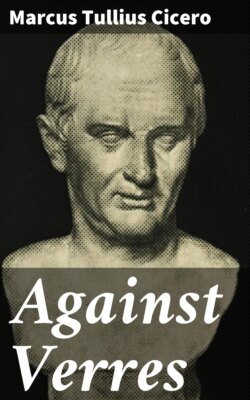Читать книгу Against Verres - Marcus Tullius Cicero - Страница 37
15
Оглавление38In truth, if we wish to disturb all these things, and to throw them into confusion, we shall render life full of danger, intrigue, and enmity; if such allurements are to have no scruples to protect them; if the connection between men in prosperous and doubtful fortunes is to cause no friendship; if the customs and principles of our ancestors are to have no authority. He is the common enemy of all men who has once been the enemy of his own connections. No wise man ever thought that a traitor was to be trusted; Sulla himself, to whom the arrival of the fellow ought to have been most acceptable, removed him from himself and from his army: he ordered him to remain at Beneventum, among those men whom he believed to be exceedingly friendly to his party, where he could do no harm to his cause and could have no influence on the termination of the war. Afterwards, indeed, he rewarded him liberally; he allowed him to seize some estates of men who had been proscribed lying in the territory of Beneventum; he loaded him with honour as a traitor; he put no confidence in him as a friend. 39Now, although there are men who hate Cnaeus Carbo, though dead, yet they ought to think, not what they were glad to have happen, but what they themselves would have to fear in a similar case. This is a misfortune common to many a cause for alarm, and a danger common to many. There are no intrigues more difficult to guard against than those which are concealed under a pretence of duty, or under the name of some intimate connection. For you can easily avoid one who is openly an adversary, by guarding against him; but this secret, internal, and domestic evil not only exists, but even overwhelms you before you can foresee it or examine into it. Is it not so? 40When you were sent as quaestor to the army, not only as guardian of the money, but also of the consul; when you were the sharer in all his business and of all his counsels, when you were considered by him as one of his own children, according to the tenor of the principles of our ancestors; could you on a sudden leave him? desert him? pass over to the enemy? O wickedness! O monster to be banished to the very end of the world! For that nature which has committed such an atrocity as this cannot be contented with this one crime alone. It must be always contriving something of this sort; it must be occupied in similar audacity and perfidy. 41Therefore, that same fellow whom Cnaeus Dolabella afterwards, when Caius Malleolus had been slain, had for his quaestor, (I know not whether this connection was not even a closer one than the connection with Carbo, and whether the consideration of his having been voluntarily chosen is not stronger than that of his having been chosen by lot,) behaved to Cnaeus Dolabella in the same manner as he had behaved in to Cnaeus Carbo. For, the charges which properly touched himself, he transferred to his shoulders; and gave information of everything connected with his cause to his enemies and accusers. He himself gave most hostile and most infamous evidence against the man to whom he had been lieutenant and pro-quaestor. Dolabella, unfortunate as he was, through his abominable betrayal, through his infamous and false testimony, was injured far more than by either, by the odium created by that fellow's own thefts and atrocities.
